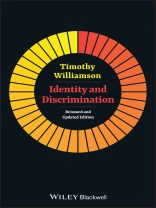Identity and Discrimination
This updated edition of Identity and Discrimination, first published in 1990 and the first book by well-known philosopher Timothy Williamson, is now reissued with the inclusion of significant new material. This major work – influential in philosophy of perception and the theory of vagueness – continues in an original and rigorous way to highlight the necessity of discrimination and the thresholds which determine the approximate criteria of identity.
Williamson’s proposal for an original and rigorous theory links identity, a relation central to metaphysics, and indiscriminability, a relation central to epistemology. He provides a distinctive cognitive account of the nature of discrimination, with important applications to the philosophy of perception and the theory of vagueness. The book pioneers the use of epistemic logic to solve the notorious paradoxes of indiscriminability, and develops the application of techniques from mathematical logic to understand issues about identity over time and across possible worlds.
Innehållsförteckning
Preface to the Revised Edition ix
Preface to the First Edition xiii
Introduction 1
1 Concepts of Indiscriminability 4
1.1 Indiscriminability and Cognition 5
1.2 Formal Features of Indiscriminability 10
1.3 The Intentionality of Indiscriminability 14
1.4 Direct and Indirect Discrimination 20
1.5 Further Reflections 21
2 Logics of Indiscriminability 24
2.1 Logical Apparatus 24
2.2 The Non-Transitivity of Indiscriminability 34
3 Paradoxes of Indiscriminability 43
4 Concepts of Phenomenal Character 48
4.1 Presentations of Characters 50
4.2 Presentation-Sensitivity 54
4.3 The Identity of Characters 62
5 Logics of Phenomenal Character 65
5.1 Maximal M-Relations 65
5.2 Ignorance and Indeterminacy 73
5.3 Matching the Same Experiences 82
6 Paradoxes of Phenomenal Character 88
6.1 The Paradox of Observational Predicates 89
6.2 The Paradox of Phenomenal Predicates 93
6.3 The Failure of Observationality 99
6.4 Sorites Arguments and Necessary Ignorance 103
7 Generalizations 109
7.1 Maximal M-Relations as Minimal Revisions 109
7.2 Examples 114
7.3 Necessary Conditions for Personal Identity 116
7.4 Sufficient Conditions 121
7.5 Close Relations 123
8 Modal and Temporal Paradoxes 126
8.1 A Modal Paradox 126
8.2 Two Temporal Paradoxes 135
8.3 Comparisons 142
9 Criteria of Identity 144
9.1 Forms 144
9.2 Functions 148
Appendix Maximal M-Relations and the Axiom of Choice 154
Notes (to the First Edition) 158
Additional Notes (to the Revised Edition) 165
References (to the First Edition) 171
Additional References (to the Revised Edition) 176
Index 179
Om författaren
Timothy Williamson is the Wykeham Professor of Logic at the University of Oxford. He has previously taught at the University of Edinburgh, Trinity College Dublin, and as a visitor at MIT, Princeton, the Australian National University, the Chinese University of Hong Kong. He is the author of Vagueness (1994), Knowledge and its Limits (2000), The Philosophy of Philosophy (Blackwell, 2007), and Modal Logic as Metaphysics (2013). He is a Fellow of the British Academy and a Foreign Honorary Member of the American Academy of Arts and Sciences.












